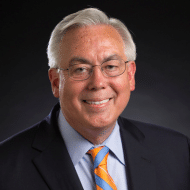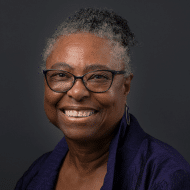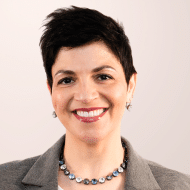
The American Sociological Association (ASA) has embarked on an ambitious fundraising effort aimed at providing its signature Minority Fellowship Program (MFP) with the support it needs to remain robust into the future.
The MFP Makes a Difference!
The MFP makes a difference in the lives of the students it supports.
The MFP allows students to focus on their dissertations and complete their degrees. The program also provides access to professional development and networking opportunities that continue to be valuable well after graduation.

“I enjoyed a career as a faculty member… Dean… [and] Provost. None of this would have been possible without the support I received from the MFP… I believe that most Fellows would not have been able to do what they have done without the support of the MFP.”
— Gary Sandefur, Dean Emeritus, College of Letters and Science, University of Wisconsin-Madison, Cohort 1, 1974-1977

“I enjoyed a career as a faculty member… Dean… [and] Provost. None of this would have been possible without the support I received from the MFP… I believe that most Fellows would not have been able to do what they have done without the support of the MFP.”
— Gary Sandefur, Dean Emeritus, College of Letters and Science, University of Wisconsin-Madison, Cohort 1, 1974-1977
“Being a Fellow fueled accomplishments and purposes throughout my career and beyond. During graduate school, it gave me a sense of identity with a group recognized as destined for success, provided mentorship and support from role models of color and otherwise, and set the stage for my receiving dissertation fellowships. [A]s faculty emerita, I find myself beaming with pride whenever I ponder the Who’s Who and the awesome accomplishments of my MFP colleagues, which span every era.”
–Ruth Peterson, Professor Emerita, The Ohio State University, Cohort 3, 1976-79


“Being a Fellow fueled accomplishments and purposes throughout my career and beyond. During graduate school, it gave me a sense of identity with a group recognized as destined for success, provided mentorship and support from role models of color and otherwise, and set the stage for my receiving dissertation fellowships. [A]s faculty emerita, I find myself beaming with pride whenever I ponder the Who’s Who and the awesome accomplishments of my MFP colleagues, which span every era.”
–Ruth Peterson, Professor Emerita, The Ohio State University, Cohort 3, 1976-79

“As a young single mom with four young children at the time, I can unequivocally say that I would not have completed my PhD without the ASA Minority Fellowship. Through the symbolism and power of this one MPF gift, my family now has three generations of experienced and emerging social and health scientists who are firmly committed to reducing social inequalities and mentoring others.”
–Linda Burton, Professor of Sociology and Dean, University of California Berkeley, Cohort 8, 1981-84

“As a young single mom with four young children at the time, I can unequivocally say that I would not have completed my PhD without the ASA Minority Fellowship. Through the symbolism and power of this one MPF gift, my family now has three generations of experienced and emerging social and health scientists who are firmly committed to reducing social inequalities and mentoring others.”
–Linda Burton, Professor of Sociology and Dean, University of California Berkeley, Cohort 8, 1981-84
“On a whim and with hope, I applied for the American Sociological Association’s Minority Fellowship Program. To my surprise, I received the fellowship. What affected me most wasn’t so much the funds from the fellowship, but rather the validation by sociologists that I could do a doctoral dissertation project… I have always been grateful to the MFP and ASA for providing the boost I needed at the right moment.”
–David Takeuchi, Associate Dean for Faculty Excellence, University of Washington, Cohort 10, 1983-86


“On a whim and with hope, I applied for the American Sociological Association’s Minority Fellowship Program. To my surprise, I received the fellowship. What affected me most wasn’t so much the funds from the fellowship, but rather the validation by sociologists that I could do a doctoral dissertation project… I have always been grateful to the MFP and ASA for providing the boost I needed at the right moment.”
–David Takeuchi, Associate Dean for Faculty Excellence, University of Washington, Cohort 10, 1983-86

“I have made so many connections through the MFP and I have a cadre of colleagues and lifelong friends as a result. And, although my career has taken a path outside of the traditional route, I choose to stay connected to the discipline and that is largely because of the MFP program and what it has meant to me.”
–Lisette Garcia, Chief Research Officer, Hispanic Association on Corporate Responsibility, Cohort 33, 2006-09

“I have made so many connections through the MFP and I have a cadre of colleagues and lifelong friends as a result. And, although my career has taken a path outside of the traditional route, I choose to stay connected to the discipline and that is largely because of the MFP program and what it has meant to me.”
–Lisette Garcia, Chief Research Officer, Hispanic Association on Corporate Responsibility, Cohort 33, 2006-09
The MFP makes a difference in the composition, culture, and capacity of the discipline of sociology.
- Our Fellows build legacies of excellence in the discipline as educators, mentors, and leaders.
- Five of the last 15 ASA Presidents have been MFP Fellows.
- Since the program’s founding in 1974, the proportion of new sociology PhD recipients who are underrepresented minorities has more than tripled.
- Collectively, Fellows have produced thousands of publications that have been cited hundreds of thousands of times.

- Our almost 500 Fellows build legacies of excellence in the discipline as educators, mentors, and leaders.
- Five of the last 15 ASA Presidents have been MFP Fellows.
- Since the program’s founding in 1974, the proportion of new sociology PhD recipients who are underrepresented minorities has more than tripled.
- Collectively, Fellows have produced thousands of publications that have been cited hundreds of thousands of times.

The MFP makes a difference in the well-being of society at national and local levels.
Especially important in this moment of racial reckoning, Fellows are having a positive impact on society through their scholarship, collaboration, and positions in government, non-profit organizations, and other sectors.
Fellows influence and amplify public discussions about important social issues.
Fellows and their scholarship have been featured in local, regional, and national media outlets, including the New York Times, the Washington Post, CNN, Esquire, and Oxford Magazine.
Fellows inform policy.
Fellows’ research has informed policy across central domains of social life, including housing, education, crime, and healthcare.
Fellows advise national and local elected leaders.
One Fellow, for example, served on President Obama’s Board of Advisors on Historically Black Colleges and Universities. Another chaired the group that advises the National Science Foundation and reports to Congress on strategies to promote participation of underrepresented groups in STEM fields.



Especially important in this moment of racial reckoning, Fellows are having a positive impact on society through their scholarship, collaboration, and positions in government, non-profit organizations, and other sectors.
Fellows influence and amplify public discussions about important social issues.
Fellows and their scholarship have been featured in local, regional, and national media outlets, including the New York Times, the Washington Post, CNN, Esquire, and Oxford Magazine.
Fellows inform policy.
Fellows’ research has informed policy across central domains of social life, including housing, education, crime, and healthcare.
Fellows advise national and local elected leaders.
One Fellow, for example, served on President Obama’s Board of Advisors on Historically Black Colleges and Universities. Another chaired the group that advises the National Science Foundation and reports to Congress on strategies to promote participation of underrepresented groups in STEM fields.



Now You Can Make a Difference!
Even in this current moment of racial reckoning, federal and private funding for programs aimed at elevating racial and ethnic minorities in STEM professions and other employment sectors has waned. At the same time, demand for participation in the MFP is strong; over the past 10 years, the acceptance rate for the program has been less than 7 percent. Thus, finding ways to reinvigorate the MFP is a critical element in ensuring a vibrant and diverse tomorrow.
The ASA MFP was originally funded by the National Institute of Mental Health and the National Institute on Drug Abuse. At its peak, the MFP funded 30 scholars (from 2000-2005) and included up to three years of funding for each Fellow. However, the MFP is now funded in part by ASA’s operating budget in combination with generous organizational and individual contributions. While this approach has sustained the program in recent years, the MFP has been scaled back commensurate with reduced funding. The program today supports just five Fellows per year with no renewal. And the stipends now offered to Fellows fall short of the current cost of living.
Without additional funding, the MFP simply cannot continue to have the impact the association envisioned when it launched the program 50 years ago. We need your help to ensure the program remains vibrant and continues to evolve in the years ahead. Of course, we recognize that programmatic changes may be made over time to meet emerging challenges, but the need for financial support will not abate.
What is needed to ensure a strong tomorrow?
With $2 Million
We can increase the Fellowship Package for each Fellow to a level that will better allow exclusive focus on studies, and we can continue to increase funding in line with inflationary needs for the next 15 years.
For Every Additional $600,000 Raised
We can provide a Fellowship Package to one additional Fellow each year for 15 years, with a stretch goal of doubling the number of Fellows to 10 each year for this same time period.
With Additional Funds Raised
Additional funds will contribute to the longer term sustainability of the program, regardless of programmatic changes that may be needed to meet emerging disciplinary demands.
With $2 Million
We can increase the Fellowship Package for each Fellow to a level that will better allow exclusive focus on studies, and we can continue to increase funding in line with inflationary needs for the next 15 years.
For Every Additional $600,000 Raised
We can provide a Fellowship Package to one additional Fellow each year for 15 years, with a stretch goal of doubling the number of Fellows to 10 each year for this same time period.
With Additional Funds Raised
Additional funds will contribute to the longer term sustainability of the program, regardless of programmatic changes that may be needed to meet emerging disciplinary demands.
An infusion of funds is needed to preserve this important program, which has already contributed so much to minority sociologists, the discipline, and the broader society. The future of the MFP depends on generous gifts from those who believe in the difference the program makes today and the difference the program will make tomorrow.
Please consider investing in the future of sociology by making a generous gift to the Minority Fellowship Program. Every gift will make a difference! When you support ASA’s MFP, you will contribute to a program that has served as a turning point in the lives of many underrepresented scholars for 50 years. Your gift will make a difference in creating opportunities for the next generation of leaders in the discipline. Your gift will make a difference in creating a more diverse and inclusive sociological community. Your gift will make a difference in creating a more just society.